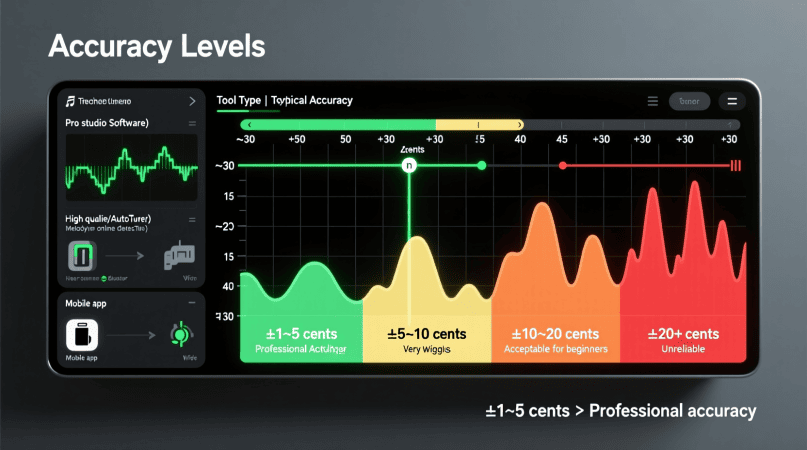
Most pitch detectors are accurate to within a few cents (1/100th of a semitone) under ideal conditions. Professional-grade software can be nearly perfect, while free apps and online tools are usually “good enough” for practice but may wobble with noise, vibrato, or extreme notes.
You can instantly analyze sound frequencies using our online pitch detection tool directly in your browser.
What “Accuracy” Means in Pitch Detection
When people ask how accurate a pitch detector is, they’re usually talking about:
- Cents off target: The closer to zero, the more in tune.
- Note recognition: Does it show the correct note, or jump to the wrong octave?
- Tracking stability: Does it stay steady during vibrato or quick runs?
For example, if you sing an A4 (440 Hz) and the detector shows 442 Hz, that’s about 8 cents sharp—barely noticeable to most ears.
Factors That Affect Accuracy
Several variables influence whether a pitch detector reads you correctly:
- Microphone quality – Cheap laptop or phone mics may distort tone. A USB condenser improves accuracy.
- Background noise – Detectors can mistake ambient sounds as part of your voice.
- Singing style – Vibrato, slides, and breathy tone can confuse algorithms.
- Pitch range – Very low bass or whistle notes often cause octave errors.
- Algorithm type – Frequency-domain methods (FFT) vs time-domain (YIN, autocorrelation). Pro tools blend methods for reliability.
Real-World Accuracy by Tool Type
| Tool Type | Typical Accuracy | Best Use Case |
|---|---|---|
| Free mobile apps | ±20–30 cents | Beginner practice, casual checks |
| Online pitch detectors | ±15–20 cents | Quick warm-ups, range testing |
| DAW plugins (ReaTune, Logic Flex Pitch) | ±5–10 cents | Recording, semi-pro training |
| Pro software (Melodyne, Auto-Tune) | ±2–5 cents | Studio-level precision |
In practice, most singers only need ±10 cents accuracy to improve their intonation and ear.
See More: check if you’re singing in tune
What Research Shows
- Studies comparing algorithms find that methods like BaNa and YIN outperform older FFT-only detectors, especially in noisy environments.
- Professional software routinely achieves accuracy better than human ears in detecting tiny deviations.
- Casual apps may misread octave jumps or slide notes, but still provide actionable feedback for beginners.
Tips for Getting the Most Accurate Results
- Sing in a quiet space with minimal echo.
- Use a quality microphone if possible.
- Hold steady notes instead of slides when testing.
- Check multiple readings to confirm consistency.
- Compare detector feedback with a piano or tuner for reference.
FAQs
How many cents off are pitch detectors?
Most are within 5–30 cents depending on quality. Pro tools get closer than 5 cents.
Are free pitch detectors reliable for singers?
Yes—for learning to sing in tune, they’re more than accurate enough.
Why does the detector sometimes show the wrong octave?
It may pick up overtones or misinterpret very low/high frequencies.
Can a pitch detector measure vibrato?
Yes, but it shows the oscillation, so focus on the center pitch.
Do microphones matter?
Absolutely. A better mic means a cleaner signal and more accurate readings.
To understand the limits of tuning tools, this overview on how pitch detection works gives useful context.
Most accuracy issues come from signal quality, which is why microphone effects on detection matter so much.
If your readings jump around, this guide on unstable pitch results explains what’s happening.
For cleaner input, using better mics and headphones can noticeably improve results.
Digital tuners rely on math, so this breakdown of FFT and pitch detection shows why accuracy varies.
You can also compare methods in this article on pitch tracking vs detection to see which is more reliable.
When you want to verify precision yourself, testing with recordings provides a simple way to measure it.
PitchDetector.com is a project by Ornella, blending audio engineering and web technology to deliver precise, real-time pitch detection through your browser. Designed for musicians, producers, and learners who want fast, accurate tuning without installing any software.
